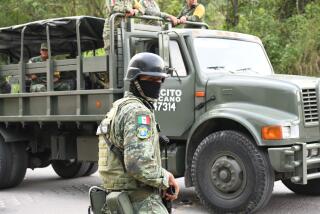Hired by Merchants to Fight Crime : Brazilâs New âExtermination Groupsâ Blamed for Killings
NOVA IGUACU, Brazil â Here in the squalid suburbs north of Rio de Janeiro, death squads have been a sinister institution for a more than a quarter of a century. Formed by off-duty policemen and working at night, the squads hunt down and summarily execute persons believed to be common criminals.
But over the years, even that extreme and illegal form of justice has failed to control rampant crime in this sprawling and impoverished area. And so another variety of so-called âextermination groupsâ has become increasingly active in the northern suburbs: Known as policia mineira, these groups are gunmen hired by local merchants to stop robberies and other crime.
Such unorthodox enforcement methods are not unique to Rio de Janeiroâs outskirts, but nowhere in Latin America is the killing so savagely concentrated. In recent weeks, bodies with bullet wounds have appeared almost daily in the dirt streets of Nova Iguacu and other suburban communities. The Brazilian press has blamed âextermination groupsâ for several hundred killings so far this year.
âCertainly, the killings have increased tremendously,â said Anadir dos Santos, a lawyer in Nova Iguacu. Dos Santos, 33, belongs to the local Justice and Peace Committee, a lay group sponsored by the local Roman Catholic diocese.
With little hope of stopping the carnage, the committee tries to analyze its causes and its dynamics. Dos Santos said the deadliest kind of group is the policia mineira.
âIt has taken the place of the death squad,â he said.
Death squads are generally believed to be policemen operating without pay, convinced that they are âcleaning up society.â The policia mineira, however, is mainly mercenary.
The term âpolicia mineiraâ refers to the neighboring state of Minas Gerais, which reputedly has a long tradition of hired guns and improvised justice.
Dos Santos and other committee members said the policia mineira includes common thugs, private security guards, police informants, former state policemen and even active duty policemen. Businessmen who are sick of robberies and vandalism hire the groups to discourage or eliminate criminals.
The groups operate with impunity, the committee members said.
âThe police know who the policia mineira members are, but they arenât interested in arresting them,â Dos Santos said.
He said law-abiding residents have come to see death squads and policia mineira as natural components of the crime-ridden society. While they are repelled by the bloodshed, according to Dos Santos, residents consider the groups to be an imperfect form of protection.
The Rev. Luiz Thomaz, a Franciscan priest in the Nova Iguacu diocese, agreed.
âThe people do not see any difference between the policia mineira and the real police,â Thomaz said.
He said residents have grown accustomed to the killings, the cheapening of human life.
âBodies remain in the streets 12, 15, 24 hours,â he said. âThey are treated like dead animals.â
Vera Machado, another member of the Justice and Peace Committee, said a bullet-riddled body was left beside a soccer field in Nova Iguacu the night before a recent game and was not removed the next morning.
âThe game went on, and no one paid attention to the body,â she said.
The policia mineira thrive particularly in the Baixada Fluminense--Portuguese for âfluvial lowlandsâ--an archipelago of slum-ridden settlements, including Nova Iguacu, that are strung out along a commuter railway north of Rio. Of the estimated 4 million people living in the Baixada, most are desperately poor.
Police forces and courts are overburdened and inefficient here, short on resources and often corrupt. For decades, crime in the Baixada has been out of control.
In the 1960s and 1970s, death-squad activity flourished. The squads often would leave brief notes on the bodies of victims.
âRobber. The Squad,â was a typical message.
Although Rioâs Baixada Fluminense was always the main hotbed of death-squad killing, similar groups operated in Sao Paulo, Recife and other Brazilian cities.
The death squads became infamous, drawing international attention. Some critics of the military government that ruled Brazil from 1964 to 1985 have contended that authorities tolerated or even encouraged the killings.
In 1983, Rio de Janeiro stateâs civilian government formed a special commission to investigate death squad and policia mineira groups. The commissionâs work resulted in indictments against 237 persons and convictions of 16, including 12 uniformed policemen.
Reports of death squad-killings decreased. The commission was quietly deactivated, and death squads were largely forgotten as the country moved toward civilian government and democracy.
Suddenly this year, a new wave of death squad activities has been reported in the Brazilian press. And the policia mineira has shared the headlines.
In one much publicized double slaying, a couple were shot down in front of their five children. The oldest child, 9-year-old Stefani Costa, said the killer âwas a man who had arrested had my father before and who said he was a policeman.â
Marcos Heusi, the state secretary of Civil Police since March, announced in late May that a new commission will be formed to investigate death squads and policia mineira in the Baixada Fluminense.
Heusi, 49, also announced that the Civil Police, a plainclothes investigative force, will be reinforced in the Baixada with hundreds of new detectives and 100 new cars.
Currently, the Civil Police has about 550 detectives and only 20 functioning cars in the Baixada.
In an interview, Heusi acknowledged that death squads are made up of âpersons directly linked to the police,â both civil and uniformed.
But he said death squad activity âhas fallen off lately. What has risen up in its place in recent times is the policia mineira . . . . The policia mineira today, in our view, is the main problem.â
From November through April, there were 1,135 homicides in the Baixada Fluminense, according to a spokesman for Heusiâs department. Heusi said Civil Police experts estimate that about 10% of those killings were carried out by death squads and 25% by policia mineira.
Another 25% of the killings are attributed to warfare between rival gangs of drug dealers and robbers. Heusi said the remaining 40% were various other types of homicide.
âGreen Light for Killing
Heusi, a lawyer and businessman, was appointed by Gov. Wellington Moreira Franco, who took office March 15 promising to drastically reduce crime in the state. According to widespread speculation, the death squads and policia mineira interpreted that promise as a âgreen lightâ for killing criminals.
Nonsense, Heusi said, arguing that death squads and policia mineira were killing at the same high rate before Moreira Franco took office. Heusi added that the civil police will do everything possible to break up the âextermination groups.â
âWe are going to combat them as though they were our principal enemies. There is no doubt about that,â he said.
But the fight wonât be easy, said Edmir Moreira, 48. He is the Civil Police âdelegateâ in charge of the precinct in Mesquita, a community of 200,000 people near Nova Iguacu.
Cases Backlogged
Moreira, a veteran detective who was transferred to Mesquita in early April, waved at high piles of file folders on his desk. âThose are backlogged cases,â he said.
Then he leafed through a log book for the month of May and counted the number of new homicides: 13. Moreira has 42 detectives to handle the flood of crime.
âYou know how many cars I have to work with? One car,â he said.
According to Moreira, heavy crime in the Baixada is the result of deep poverty, a lack of opportunities for youth and a lack of resources for law enforcement. But when desperate merchants turned to the policia mineira as a means of controlling the crime, they opened a Pandoraâs box, he said.
âThose groups are uncontrollable,â he said.
And few people are brave enough to help the Civil Police in their investigations.
âAll of the residents are afraid,â Moreira said. âOnce in a while an anonymous telephone call comes in, but people are afraid of reprisals, of revenge.â
More to Read
Sign up for Essential California
The most important California stories and recommendations in your inbox every morning.
You may occasionally receive promotional content from the Los Angeles Times.










